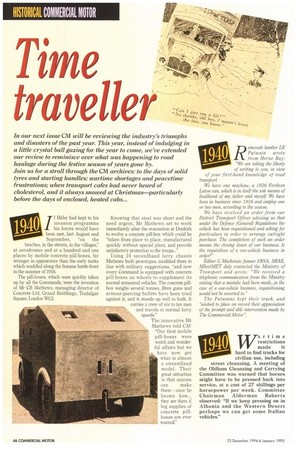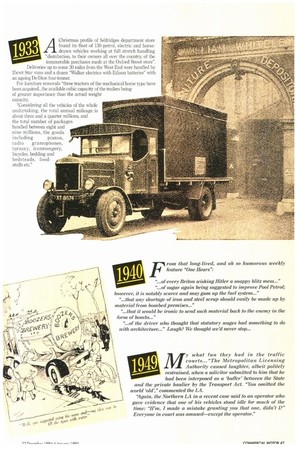Time traveller
Page 48

Page 49

If you've noticed an error in this article please click here to report it so we can fix it.
In our next issue CM will be reviewing the industry's triumphs and disasters of the past year. This year, instead of indulging in a little crystal ball gazing for the year to come, we've extended our review to reminisce over what was happening to road haulage during the festive season of years gone by.
Join us for a stroll through the CM archives: to the days of solid tyres and starting handles; wartime shortages and peacetime frustrations; when transport cafes had never heard of cholesterol, and it always snowed at Christmas—particularly before the days of enclosed, heated cabs...
.1f Hitler had kept to his invasion programme his forces would have been met, last August and September, on the
beaches, in the streets, in the villages," at aerodromes and at a hundred and one places by mobile concrete pill-boxes, far stranger in appearance than the early tanks which waddled along the Somme battle-front in the summer of 1916.
The pill-boxes, which were quickly taken up by all the Commands, were the invention of Mr CB Mathews, managing director of Concrete Ltd, Grand Buildings, Trafalgar Square, London WC2. Knowing that steel was short and the need urgent, Mr Mathews set to work immediately after the evacuation at Dunkirk to evolve a concrete pill-box which could be "taken from place to place, manufactured quickly without special plant, and provide satisfactory protection to the troops..."
Using 24 secondhand lorry chassis Mathews built prototypes, modified them in line with military suggestions, and now every Command is equipped with concrete pill-boxes on wheels to supplement its normal armoured vehicles. The concrete pillbox weighs several tonnes...Bren guns and armour-piercing bullets have been tried against it, and it stands up well to both, It carries a crew of six to ten men and travels at normal lorry
t> speeds." ,
The innovative Mr Mathews told CM: "Our first mobile pill-boxes were weird and wonderful affairs but we have now got what is almost a streamlined model. Their great attraction is that anyone can make them—once he knows how... they are there if big supplies of concrete pillboxes are ever wanted."
Removals haulier LE Putwain wrote from Herne Bay: "We are taking the liberty of writing to you, in view
of your first-hand knowledge of road transport.
We have one machine, a 1936 Fordson Luton van, which is in itself the sole means of livelihood of my father and myself We have been in business since 1918 and employ one or two men, according to the season.
We have received an order from our District Transport Officer advising us that under the Defence (General) Regulations the vehicle has been requisitioned and asking for particulars in order to arrange outright purchase. The completion of such an order means the dosing down of our business. Is the requisition of a one-vehicle business in order?"
Editor G Mackenzie Junner FRSA, MIAE, MInstMET duly contacted the Ministry of Transport and wrote: "We received a telephonic communication from the Ministry stating that a mistake had been made..in the case of a one-vehicle business, requisitioning would not he resorted to."
The Putwains kept their truck, and "wished to place on record their appreciation of the prompt and able intervention made by The Commercial Motor".
Wartime restrictions made it hard to find trucks for civilian use, including street cleansing. A meeting of the Oldham Cleansing and Carrying Committee was warned that horses might have to be pressed back into service, at a cost of 27 shillings per horsepower per week. Committee Chairman Alderman Roberts observed: "If we keep pressing on in Albania and the Western Desert perhaps we can get some Italian vehicles." AChristmas profile of Selfridges department store found its fleet of 130 petrol, electric and horsedrawn vehicles working at full stretch handling "distribution, to their owners all over the country, of the innumerable purchases made at the Oxford Street store".
Deliveries up to some 30 miles from the West End were handled by 25cwt Star vans and a dozen "Walker electrics with Edison batteries" with an ageing De-Dion four-tonner.
For furniture removals "three tractors of the mechanical-horse type have been acquired...the available cubic capacity of the trailers being of greater importance than the actual weight capacity "Considering all the vehicles of the whole undertaking, the total annual mileage is about three and a quarter millions, and the total number of packages handled between eight and nine millions, the goods including pianos, radio gramophones, turnery, ironmongery, bicycles, bedding and bedsteads, foodstuffs etc."
From that long-lived, and oh so humorous weekly feature "One Hears": "...of every Briton wishing Hitler a snappy blitz mess..."
"...of sugar again being suggested to improve Pool Petrol; however, it is notably scarce and may gum up the fuel system..."
"...that any shortage of iron and steel scrap should easily be made up by material from bombed premises..."
"...that it would be ironic to send such material back to the enemy in the form of bombs..."
"...of the driver who thought that statutory wages had something to do with architecture..." Laugh? We thought we'd never stop...
My what fun they had in the traffic courts... "The Metropolitan Licensing Authority caused laughter, albeit politely restrained, when a solicitor submitted to him that he had been interposed as a 'buffer' between the State and the private haulier by the Transport Act. "You omitted the world 'old'," commented the LA.
"Again, the Northern LA in a recent case said to an operator who gave evidence that one of his vehicles stood idle for much of the time: "H'm, I made a mistake granting you that one, didn't I?" Everyone in court was amused—except the operator."




















































































































